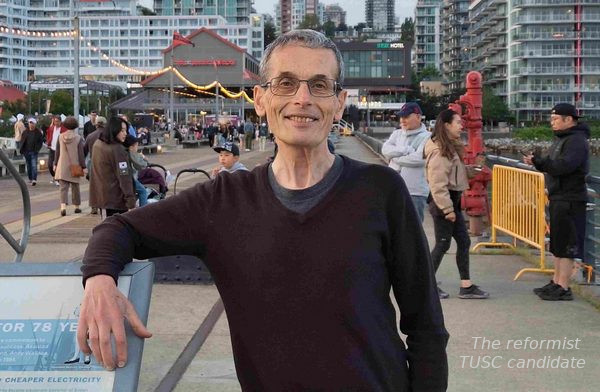Fake socialism

In October there was a by-election to elect a new ward councillor in South Acton, London borough of Ealing. One of the 8 candidates was David Hofman standing for the Trade Unionist and Socialist Coalition (TUSC). Though TUSC is nominally an umbrella organisation of various unions and small left political groupings, it is in fact dominated by the ‘Socialist Party’, the organisation that arose in 1997 when the so-called ‘Militant Tendency’, which operated within the Labour Party to try and push it to the left and then renamed itself ‘Militant Labour’, was effectively expelled by Labour together with its members. It initially called itself the ‘Socialist Party of England and Wales’ (SPEW), but later dropped the ‘England and Wales’, effectively hijacking the commonly used name of our own Party, the Socialist Party of Great Britain.
But what kind of organisation is this so-called ‘Socialist Party’, which campaigned for election in South Acton under the name of TUSC? Is it a socialist organisation in the sense that we understand socialism, ie, a moneyless, wageless society of common ownership, voluntary cooperation and free access to all goods and services? Or is it something different?
In an interview with Ealing News, the TUSC candidate for South Acton, David Hofman, outlined its aims and objectives. Having pointed out that he had been one of those expelled from the Labour Party in the 1990s, Hofman explained that among his recent political activities had been ‘the campaign to retain Ealing libraries, and other campaigns to save local services’ and that he had been involved in assisting and participating in various trade union activities. The main issues he said he was campaigning on were restoration of the winter fuel allowance, recently removed from some pensioners by Keir Starmer’s new Labour government, and the need to ‘tackle the housing crisis’. If elected he would campaign on Ealing Council to give emergency heating grants to pensioners in need so that they did not have to choose whether ‘to heat or eat’, and he would campaign for the Starmer government to return to Ealing funding ‘stolen’ from it by Westminster via austerity policies since 2010. This, he continued, would allow the Council ‘to start addressing the housing and other local service issues and to avert ‘further rounds of cuts, closures, redundancies, and outsourcing of services’, via ‘a no-cuts needs budget’. The candidate’s election leaflet contained a further ‘wish list’ of reforms including mass council house building, a £15 an hour minimum wage, well-paid jobs for all, free public transport and an end to privatisation of utilities.
It would be churlish in a way to argue with such aspirations, especially those such as helping pensioners to keep warm that might be achievable, even if in fact most of the candidate’s proposals for reforms are probably not achievable within the framework of the system we live in. But even if they were, they would remain just that – reforms. They would be relatively small tweaks to how the buying and selling system operates, the system that inevitably means vast disparity of wealth between those who own the means of living and those who are obliged to sell their energies to produce goods and services for sale on the market. David Hofman did show an awareness of this disparity in talking about wealth being ‘concentrated in the hands of a tiny minority’, but that was combined with a failure to appreciate that this cannot be rectified by what are small – and possibly short-term – reforms which leave the basic blocks of the system in place – money, wages, buying and selling, production for profit not need. In other words, it would be no more than tinkering at the edges. As a sage once said, ‘The system cannot fix the system’.
In the end, the TUSC grouping that Hofman stood for in that by-election, though claiming to be socialist, is not socialist at all. Like so many left-wing groups, it is a reformist alliance that not only never says a single word about socialism in its genuine sense, as the candidate never did in his interview, but in sticking to advocacy of reforms, leads people to think that this is what socialism is, so causing confusion.
In his interview the candidate did talk about the need to ‘help bring a new workers’ party into existence’, but our news for him is that one already exists, the Socialist Party (of Great Britain). Of course, we remain to be recognised as such by the vast majority of workers. But the plain fact is that only when the message we exist to propagate gains that recognition, will we be on the way to the real societal change that is socialism. At the same time we recognise that the social consciousness on the part of the majority of workers needed for this is not something that can be rushed or conjured into existence. It can only develop at its own pace and the single purpose of the SPGB is to assist that process as much as possible by helping to spread the idea of what socialism really is.
David Hofman, despite the attractive package of reform measures TUSC was advocating, got only 18 votes, quite possibly fewer than would have gone to a candidate presenting a straight socialist programme of abolition of capitalism and its buying and selling system and a society of free access based on from each according to ability to each according to need.
HKM
Next article: John Prescott: a Labour man through and through ➤
